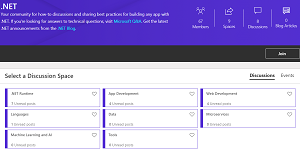News
Microsoft Unveils .NET Tech Community Forums
Microsoft, in the process of unifying all things .NET with the upcoming .NET 6, has also been unifying .NET communities, with the latest move along that line being the introduction of new forums.
The .NET Tech Community Forums site is now online, serving as a one-stop-shop for all .NET developer topics and discussions.
The new site was prompted by developer feedback that followed last year's introduction of Microsoft Q&A for .NET.
"We have heard feedback from our developer community that a space is needed to have more interactions beyond Q&A," said James Montemagno, principal lead program manager, .NET Community, in a Nov. 4 blog post. "You have told us you are looking for a dedicated forum where you have technical discussions, talk about best practices, chat about new releases, and share how-to guidance."
And that's exactly what's going on now, though the brand-new site at the time of this writing shows only 67 members, nine spaces, eight discussions and zero blog articles.
 [Click on image for larger view.] .NET Tech Community Forums (source: Microsoft).
[Click on image for larger view.] .NET Tech Community Forums (source: Microsoft).
One of those members is Scott Hanselman, Microsoft's principal community architect for Web Platform and Tools, who yesterday penned a post titled "Who is using Hot Reload?" Other posts were about C# 10, ASP.NET Core, Blazor and more.
The site lets developers follow topics in which they're interested via RSS or e-mail updates, join other communities around products or special topics, create a profile and earn achievements.
"No matter if you are a web developer, mobile & desktop developer, into microservices, data, machine learning, or just getting started, there is a discussion space for you!" Montemagno said. "Simply join the .NET tech community, pick a discussion space, start a new discussion, and collaborate with other .NET developers!"
About the Author
David Ramel is an editor and writer at Converge 360.